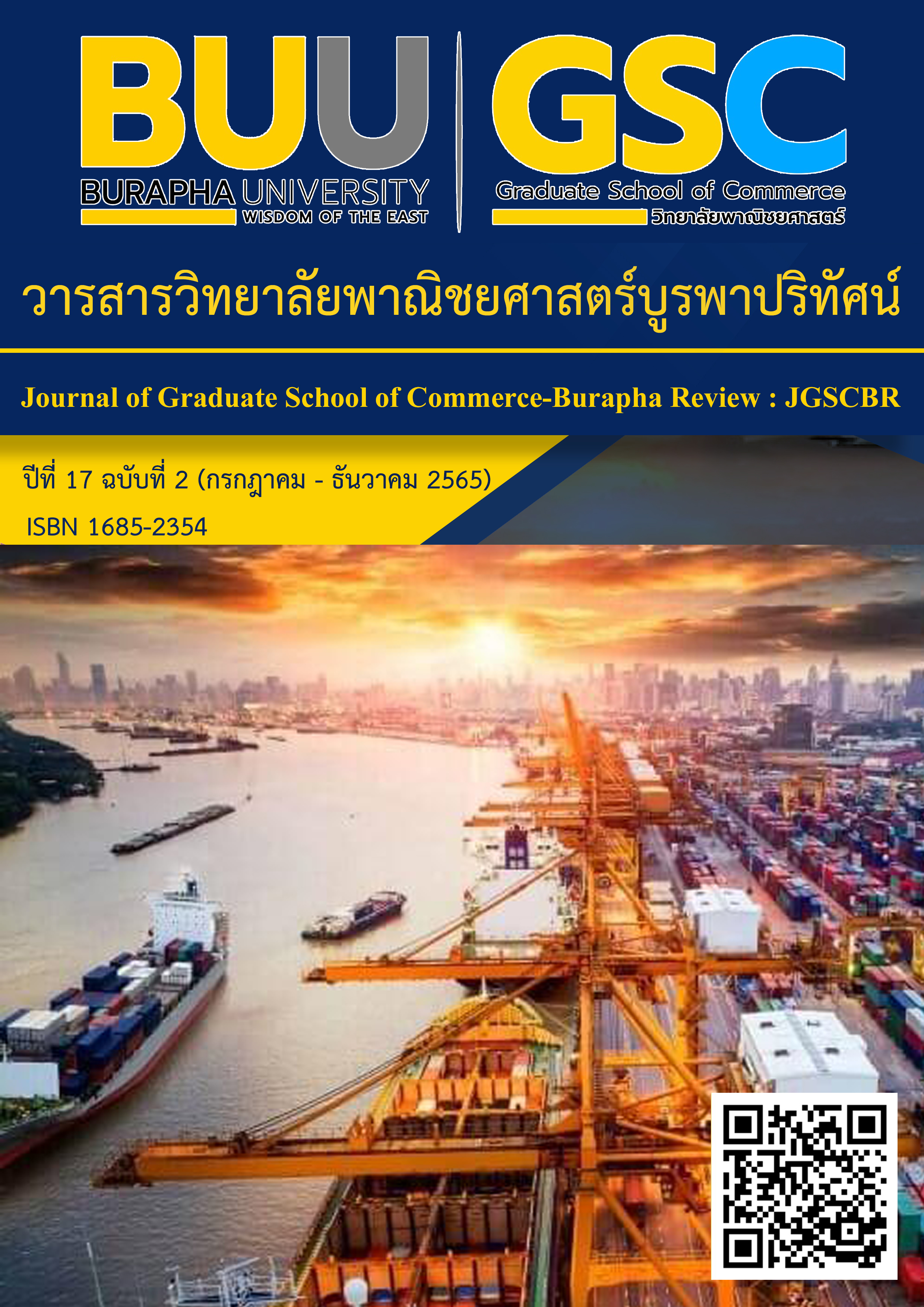A STUDY OF FACTORS AFFECTING EMPLOYEE PERFORMANCE IN THE INDUSTRY 4.0: A CASE SYUDY OF DAISIN CO.,LTD.
Main Article Content
Abstract
The purposes of this research were to 1) study the factors of technology adoption that affect employee performance in Industry 4.0; 2) study the organizational factors affecting the efficiency of employees' performance in Industry 4.0; and 3) study the human factors affecting the performance of employees in the Industry 4.0 in a case study of Daisin Co., Ltd. Employees of Daisin Co., Ltd. were utilized as samples in this study. A total of 310 personnel were employed in this investigation.
The results of the research revealed that the factors of technology adoption, including perceived usefulness and the perception of ease of use, and organizational factors including personnel support, human development, and the commitment of the organization, operational efficiency at a high level. As a consequence, if an organization is dedicated to supporting the adoption of Industry 4.0 technology, it will be able to observe and embrace the benefits that occur, which will have an impact on operational efficiency. In terms of personnel factors, knowledge and understanding of Industry 4.0 technology had a moderate impact on operational efficiency. As a result of the target group, the majority of them are operational-level employees, which means they have the fundamental working skills required to follow an established standard procedure.
Article Details

This work is licensed under a Creative Commons Attribution-NonCommercial-NoDerivatives 4.0 International License.
The owner of the article does not copy or violate any of its copyright. If any copyright infringement occurs or prosecution, in any case, the Editorial Board is not involved in all the rights to the owner of the article to be performed.
References
Adhi Nugroho, M., Andryzal Fajar, M. (2017). Effects of Technology Readiness Towards Acceptance of Mandatory Web-Based Attendance System.: Electronic Journal of Information Technology in Construction. 25, 161-172
Rojko, A. (2017). Industry 4.0 Concept: Background and Overview: International Journal of Interactive Mobile Technologies. 11(5), 77-90
Davis, F.D. (1989). Perceived Usefulness, Perceived Ease of Use, and User Acceptance of Information Technology. Mis Quarterly.13(4), 319-340.
Gordon, R. F, Mirella, Y.S. (2005). Situational influences on consumers' attitudes and behavior.: Journal of Business Research. 58(4), 518-525.
Gotfredsen, S.(2016). Bringing back the human touch: Industry 5.0 concept creating factories of the future. Retrieved from https://www.manmonthly.com.au/features/bringing-back-the-human-touch-industry-5-0-concept-creating-factories-of-the-future/
Gutteridge, T., Leibowitz, Z., & Shore, J. (1993). When careers flower, organizations flourish. Training & Development. 47(11), 24
Emerson, H. (1912). The twelve principles of efficiency. New York, Engineering magazine: Retrieved from https://en.wikiquote.org/wiki/Harrington_Emerson
Ferràs-Hernández, X., Tarrats-Pons, E., Arimany-Serrat, N. (2017). Disruption in the automotive industry: A Cambrian moment: Business Horizons. 60(6), 855-863
Farahat, T. (2012). Applying the Technology Acceptance Model to Online Learning in the Egyptian Universities Procedia. Social and Behavioral Sciences.64, 95–104.
Heaney, C.A , Israel, B.A ,Schurman, S.J ,Baker, E.A ,House, J.S., & Hugentobler,M. (2006). Industrial relations, worksite stress reduction, and employee well-being: A participatory action research investigation. Retrieved 30 Apr 2022, Retrieved from https://onlinelibrary.wiley
.com/doi/pdf/10.1002/job.4030140510
Javaida, M., Khanb, I.H. (2021). Internet of Things (IoT) enabled healthcare helps to take the challenges of COVID-19 Pandemic: Journal of Oral Biology and Craniofacial Research.11(2), 209-214.
Kohnova, L., Papola, J., & Salajova, N. (2019). Internal factors supporting business and technological transformation in the context of Industry 4.0. Theory and Practice. 20, 137–145
Ligarski, M.J, Rozałowska, B. & Kalinowski, K. (2021). A Study of the Human Factor in Industry 4.0 Based on the Automotive Industry: MDPI.Energies. 14, 6833
Mohammad, A.S. (2003). Analyzing manufacturing strategies and Industry 4.0 supplier performance relationships from a resource-based perspective: Benchmarking: An International Journal. 28(5), 1697-1716.
Miao, R, Kim, H.G. (2010). Perceived Organizational Support, Job Satisfaction and Employee Performance: An Chinese Empirical Study.: Journal of Service Science and Management. 3(2), 257-264.
Legris, P., Ingham, J., & Collerette, P. (2001). Why do people use information technology? A critical review of the technology acceptance model: Information & Management. 40, 191–204.
Peterson, E & Plowman, E.G. (1989). Business Organization and Management. Homewood, Illinois: Richard D. Irwin
Hempel, P.S. (2004). Preparing the HR profession for technology and information work: Human Resource Management. 43(2-3), 163-177.
Rogers, E.M. (1995). Diffusion of Innovations, 4th ed.; The Free Press: New York, NY, USA.
Rosly, R.M., & Khalid, F. (2018). Evaluation of the “e-Daftar” system using the technology acceptance model (TAM). Creative Education. 9, 675-686.
Shaw, P. & Varghese, R.M. (2018). INDUSTRY 4.0 AND FUTURE OF HR.: Journal of Management (JOM). 5(6), 96-103.
Roblek, J., Meško, M. & Krapež, A. (2016). A Complex View of Industry 4.0: SAGE Open. 6(2), 1–11
Wewerka, J., Dax, S., & Reichert, M. (2020). A User Acceptance Model for Robotic Process Automation: 2020 IEEE 24th International Enterprise Distributed Object Computing Conference (EDOC). 24 , 97-106.
Yamane, T. (1973). Statistics: An Introductory Analysis (3rd ed.). New York: Harper and Row.
จุฑารัตน์ เพ็ชรสุวรรณ. 2560. "การพัฒนาทรัพยากรมนุษย์ที่ส่งผลต่อประสิทธิภาพในการปฏิบัติงานของ พนักงานโรงแรมบางกอกเซ็นเตอร์." การค้นคว้าอิสระวิทยาศาสตรมหาบัณฑิต สาขาวิชาการจัดการทรัพยากรมนุษย์ วิทยาลัยบัณฑิตศึกษาด้านการจัดการ มหาวิทยาลัยศรีปทุม.
ชาญชัย อรรคผาติ 2557. "ปัจจัยที่ส่งผลต่อทัศนคติในการยอมรับเทคโนโลยีคราวด์คอมพิวติ้ง เพื่อประยุกต์ใช้ในการให้บริการระบบบัญชีออนไลน์ สำหรับวิสาหกิจขนาดกลาง และขนาดย่อม ในมุมมองของผู้ทำบัญชี." วิทยานิพนธ์บัญชีมหาบัณฑิต สาขาวิชาการบัญชี มหาวิทยาลัยธุรกิจบัณฑิตย์
ธนัญกรณ์ ทองเลิศ (2562) .ปัจจัยที่ส่งผลต่อประสิทธิภาพในการปฏิบัติงานของบุคลากรสำนักงานปลัดกระทรวงอุตสาหกรรม: วารสารการบริหารการศึกษา มหาวิทยาลัย 10(2), 92-102
ณัฐรัตน์ สุขใย (2560) การศึกษาปัจจัยส่วนบุคคล การยอมรับเทคโนโลยี และวัฒนธรรมองค์กร ที่ส่งผลต่อประสิทธิผลการทำงานของพนักงานธนาคารกรุงไทย จำกัด (มหาชน) สังกัดกลุ่มเครือข่ายภาคกลาง: การค้นคว้าอิสระ, บริหารธุรกิจมหาบัณฑิต, มหาวิทยาลัยกรุงเทพ, กรุงเทพมหานคร
บริษัท ไดซิน จำกัด (2557) DAISIN Group History : Retrieved from http://www.daisin.co.th/about
_history_en.html
ปริญญ์ บุญกนิษฐ, สหรัตน์ วงษ์ศรีษะ และเสกสรร กันธรส (2561) กระบวนการสนับสนุนการตัดสินใจในการพัฒนากระบวนการผลิต เพื่อศักยภาพในการแข่งขันตามแนวคิดอุตสาหกรรม 4.0: การค้นคว้าอิสระ, คณะวิศวกรรมศาสตร์, มหาวิทยาลัยเทคโนโลยีราชมงคลพระนคร, กรุงเทพมหานคร
มนพะงา เล็กขาว (2557) ความมุ่งมั่นในการทำงาน และการปฏิบัติงาน: กรณีศึกษา กรมป้องกัน และบรรเทาสาธารณภัย: ปรัชญาดุษฎีบัณฑิต, รัฐประศาสน์ศาสตร์, มหาวิทยาลัยรามคำแหง, กรุงเทพฯ
รัชนี ชอบศิลป์ และ จุฑามาศ ทวีไพบูลย์วงษ์ (2563).การรับรู้ความง่าย การรับรู้ประโยชน์ทัศนคติและการยอมรับในการทำงานร่วมกับห่นุยนต์ของพนักงานในบริษัทผู้ผลิตชิน้ ส่วนยานยนต์แห่งหน่ึงในเขตนิคมอุตสาหกรรมอมตะซิตี้ จังหวัดชลบุรี: วารสารบริหารศาสตร์ มหาวิทยาลัยอุบลราชธานี. 10(1), 36-50
ศูนย์วิจัยธนาคารกรุงศรี จำกัด (มหาชน) (2563) อุตสาหกรรมชิ้นส่วนยานยนต์: บทวิเคราะห์เศรษฐกิจ แนวโน้มธุรกิจ/อุตสาหกรรม ปี 2563-65 , ศูนย์วิจัยธนาคารกรุงศรี จำกัด (มหาชน), กรุงเทพมหานคร. วันที่ค้นข้อมูล 20 ธันวาคม 2564, เข้าถึงได้จาก https://www.krungsri.com/th/research/industry
/industry-outlook/Hi-tech-Industries/Auto-Parts/IO/Industry-Outlook-Auto-Parts
อัครเดช ไม้จันทร์ (2564) .ปัจจัยที่มีผลต่อประสิทธิภาพในการปฏิบัติงานของพนักงานกลุ่มอุตสาหกรรมติดตั้งเครื่องจักรสายการผลิตในจังหวัดสงขลา: วารสารราชภัฏสุราษฎร์ธานี 5(1), 95-121


